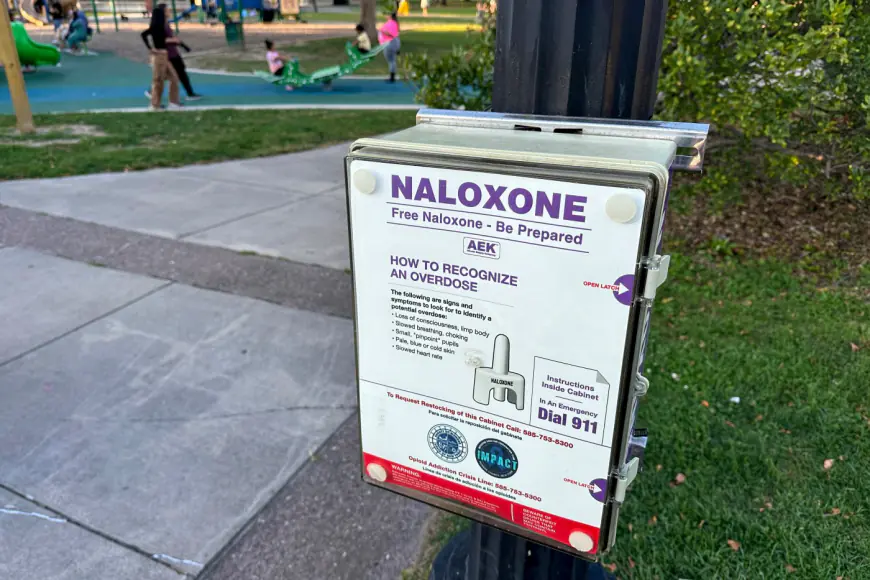Freibott: Expand access to anti-opioid drugs on campus
Fentanyl’s prevalence in the illicit drug market has made overdoses a universal risk, affecting a wide range of students – beyond those who knowingly use opioids.

College campuses are microcosms of our society — diverse, dynamic, and faced with unique challenges, including the ongoing opioid crisis. As someone deeply engaged in researching how higher education institutions are approaching this issue, I’ve heard from college administrators and students alike that equipping campuses with opioid reversal agents is an essential component of their overdose prevention strategy.
Fentanyl’s prevalence in the illicit drug market has made overdoses a universal risk, affecting a wide range of students – beyond those who knowingly use opioids. For college students, who represent a population navigating a time of transition, experimentation, stress, and peer influence, the risks are exceptionally high – as there are more than 20 million adolescents and young adults unrolled in US higher education.
Colleges and universities across the country are implementing opioid overdose prevention programs in myriad ways, including increasing access to opioid antagonists on campus. A number of states have passed laws expressly mentioning the storage, possession, and/or administration of opioid antagonists at higher education institutions. However, Massachusetts is not yet one of these states. Given that the state is home to more than 200 higher education institutions, this is an opportunity for improvement.
Importantly, these state policies vary in content and scope – some simply require access to opioid antagonists, while others mandate education and training for students, faculty and staff.
Some policies specifically name opioid antagonists for widespread distribution. This is cause for concern, however, as widespread access to all FDA-approved opioid antagonists – which can be easily administered as a nasal spray – should be as readily available. It’s about having a full toolbox ready for an unpredictable fentanyl crisis. The goal should be to equip every campus, regardless of size, geography, or resources, with the tools they need to respond effectively. As more than 90% of opioid overdose fatalities in Massachusetts are fentanyl-related, this is a much-needed next step.
One of the most inspiring aspects of my research is seeing how students themselves are driving these efforts. This isn’t an administrative initiative forced from the top. It’s a demand from the ground up. Students recognize the dangers and want their schools to act, both for themselves and to be ready for their friends and peers. They view access to opioid antagonists as a baseline safety measure, akin to having defibrillators readily available in campus dorms.
However, stigma remains a barrier. Some administrators worry that the presence of such antagonists might signal a drug problem on campus, deterring prospective students and families. Acknowledging the reality of the dangers posed by fentanyl isn’t an admission of failure; it’s a commitment to safety and wellbeing of their students.
Data I’ve collected show that while awareness about opioid antagonists is growing, there’s still a significant knowledge gap. In a national sample, around one-third of college students knew what the most common opioid reversal agent was, but fewer than 15% knew how to use it. Encouragingly, more than two-thirds said they’d be willing to intervene in an overdose situation. This highlights a critical need for education and training, paired with easy access to the necessary tools.
Education isn’t just about informing students of the risks but empowering them to act. Programs should include recognizing an overdose, how to administer reversal agents, and where to access campus and community resources. These efforts would be strengthened by state policies requiring higher education institutions to have FDA-approved reversal agents readily available so that no life is lost due to bureaucratic delays or geographic disparities.
We have a clear path to mitigate the opioid crisis on campuses. Policymakers must broaden legislation to include all opioid antagonists under the state’s Standing Orders, ensuring schools can access whatever tools are most effective for their communities. Colleges must invest in prevention and education programs that reflect the real risks students face today, not just those assumed in the past.
Providing students with tools to protect them in case of emergency is an investment in their future. It’s about equipping them with the knowledge to thrive academically and the tools to safeguard their well-being. As fentanyl continues to infiltrate drug supplies, access to opioid reversal agents must – and is becoming – the norm on college campuses.
Students are asking for help and protection. Let’s listen.
Christina Freibott is a PhD candidate at Boston University School of Public Health
What's Your Reaction?









































































































